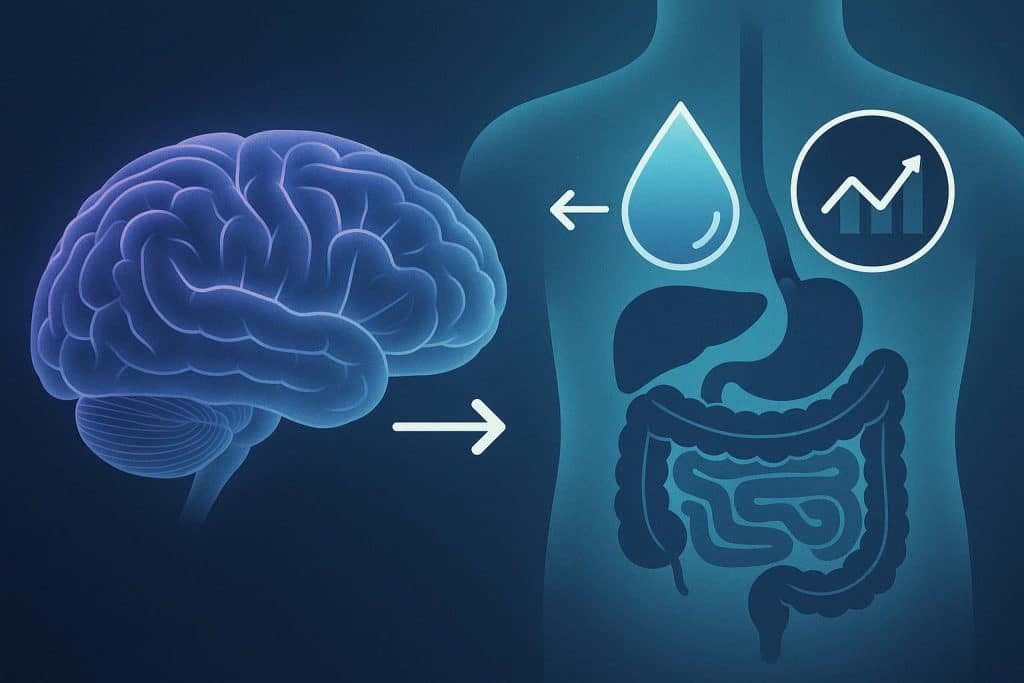In knowledge-driven industries like publishing and technology, cognitive capital is your most valuable asset. The ability to maintain deep focus, navigate complex problems, and generate innovative ideas is the cornerstone of professional success. Yet, many high-achievers inadvertently undermine this capacity through metabolic dysregulation, often without realising the connection.
The latest research in nutritional psychiatry and metabolic science confirms what clinicians have observed for years: the brain does not operate in a vacuum. Its performance is directly fuelled and modulated by the body’s metabolic processes.
The Direct Link Between Glucose and Focus
The brain consumes about 20% of the body’s energy, primarily from glucose. However, the quality of that glucose delivery is what separates mental clarity from brain fog.
Consuming high-glycemic foods – like sugary snacks or refined carbohydrates – triggers a rapid spike and subsequent crash in blood glucose. This rollercoaster forces the brain to adapt to wildly fluctuating energy levels, which manifests as that familiar 3 PM slump, irritability, and compromised decision-making. Stable glucose levels, in contrast, provide a steady, reliable energy source, allowing for sustained concentration.
The Hormonal Drivers of Mental Clarity
Viewing food through a hormonal lens, rather than a simple caloric one, is critical for professionals.
- Insulin Sensitivity: When cells become resistant to insulin, the body produces more of it to manage blood sugar. Chronic high insulin is linked to systemic inflammation, which can impair cognitive function and neural efficiency.
- Cortisol Management: The stress of deadlines and complex projects elevates cortisol. While acute stress can sharpen focus, chronic elevation disrupts sleep architecture and can impair memory function. Nutrition plays a key role in modulating the body’s stress response.
The goal of strategic eating, therefore, shifts from weight control to achieving hormonal harmony for peak mental performance.
A Framework for Metabolic and Cognitive Efficiency
Optimising this connection doesn’t require extreme diets. It involves foundational, evidence-based principles:
- Macronutrient Balance for Stability: Prioritising protein and healthy fats at meals slows the absorption of carbohydrates. This simple step prevents the sharp blood sugar spikes and crashes that disrupt focus, providing a stable mental energy source throughout the day.
- Anti-Inflammatory Nutrition: The brain is highly susceptible to inflammation. A diet rich in omega-3 fatty acids (found in fatty fish), antioxidants (from colourful vegetables), and phytonutrients helps protect neural tissue and supports cognitive longevity.
- Movement as a Metabolic Regulator: For those in sedentary roles, consistent, gentle movement is non-negotiable for metabolic health. Activities like daily walking and resistance training improve insulin sensitivity, ensuring the body uses fuel more efficiently. This metabolic efficiency directly translates to more consistent energy availability for the brain.
Understanding these principles is the first step. For those seeking to implement a structured approach, working with a specialist weight loss nutritionist can provide a personalised roadmap. The most effective strategies are those tailored to an individual’s unique metabolic profile, as explored in specialised programs like metabolic health and weight loss coaching focused on metabolic optimisation and sustainable health.
Investing in Your Cognitive Foundation
In a sector that runs on intellect and innovation, supporting your metabolic health is not a lifestyle perk – it is a strategic professional investment. By aligning your nutritional intake with your cognitive demands, you build a foundation for sustained energy, resilience, and mental clarity that can withstand the pressures of a demanding career.
